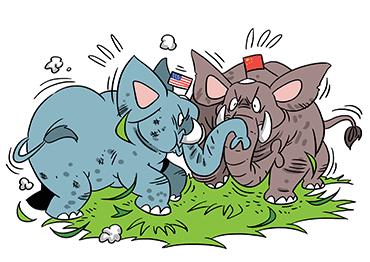“China and the US are too big. One influences the whole world and the other opens to it. If the two powers have a good relationship, other countries wouldn’t necessarily be happy about it, because it would leave them little room to maneuver. But if the two are in conflict, that would also make trouble for other countries. They are like two elephants: No matter if they are in love or fighting, the grass below always suffers.”
Blogger Qiao Mu on his WeChat account
“Over the past 10 years, income growth in rural areas lagged behind urban areas for the first time. This is what policymakers should focus on.”
Shen Jianguang, deputy president of e-commerce giant JD.com and council member of the China Chief Economist Forum, at the latest China Macroeconomy Forum hosted by JD.com and the Renmin University of China
“If we say that talking about our weaknesses gives others a weapon against us or that it is unpatriotic to talk about other countries’ strengths, that means China’s reform and opening-up is over. China is committed to reform and opening-up, and I can tell you in no uncertain terms that China is responding to this change with a more open attitude.”
Bai Yansong, anchor of China Central Television (CCTV) during an interview with China Philanthropist, a magazine of the China News Service
“I hope China can really improve its quality and efficiency during the economic slowdown period, namely increase GDP per capita, improve industrial infrastructure, reduce the income gap and prevent the middle-income trap by reforming institutions and factors of production.”
Economist Guan Qingyou in an interview with Z.H. Island, a social media account for entrepreneurs and economists
“To be fair, over the last few decades, we have learned many things from the United States. There are still things we have not learned from the US, and things I think we should never learn from the United States, such as obsession with global dominance.”
Cui Tiankai, Chinese Ambassador to the US, in an interview with Nicholas Burns, Executive Director of the Aspen Strategy Group, and Andrea Mitchell at NBC News, at the latest virtual Aspen Security Forum on August 4
“The US on one hand boasts about its freedom of the press, while on the other interferes with and obstructs Chinese media from conducting interviews in the US. This shows the US’s hypocrisy of stark double standards and hegemony.”
Wang Wenbin, spokesperson for China’s Ministry of Foreign Affairs, commenting on the US’s restrictions on visa expiration dates for Chinese journalists in the US
“This wave of anti-China sentiment masks the West’s own Covid-19 failures.”
Richard Horton, editor-in-chief of The Lancet, writing for The Guardian on August 3
“Impacted by the restricted population flows and risks of human contact in the wake of the [Covid-19] pandemic, Chinese service industries resumed more slowly than other industries, which will become a leading obstacle for China to restore the national economy for the rest of the year.”
Economist Liu Xiaoshu writing for financial portal Caixin
“Central banks cannot adjust interests rates now because they wouldn’t be able to bear their governments’ debts. But in a flash, they could adjust rates in response to external impacts. So, the future global economy is totally determined by policy variables.”
Zhu Min, former deputy president of the IMF and director of the National Institute of Financial Research at Tsinghua University, suggesting at the latest China Macroeconomy Forum that the world is entering a policy-dominated economy

 Old Version
Old Version




